With 70% of the vote, Amanda Fritz, a neighborhood activist and Registered Nurse, has been elected to Portland City Council.
Ms. Fritz, who lost a bid for Commissioner in 2006, won a decisive victory over Charles Lewis and she is the first non-incumbent to win a council seat using Portland’s public campaign funding system.
Fritz seems likely to be a very capable and effective commissioner. She’s very detail-oriented, has a lot of experience on local issues, and she listens and actively tries to engage all perspectives.
I sat down with her back in May and she said one the most important ways she can help improve cycling in Portland is by helping bridge an anti-bike divide that sometimes bubbles up in our city.
Fritz admitted she’s not a cyclist, but said that’s what can make her effective;
“We have to recognize lots of different perspectives. I can help different people listen to each other and feel like they know there were heard. I�m not a biker and thats why I can be heard.”
With a plan to be engaged and accountable to the community like no other commissioner, Fritz promised me that, if elected, she would coordinate a series of community discussions about key issues � with the bike/car divide being one of them.
That’s a perspective perfectly aligned with Fritz’s main mantra throughout her campaign; that she stands for “all 95 neighborhoods” in Portland (even those where bikes aren’t a major part of the daily traffic mix).
With a history of being outspoken both in the many City Council meetings she’s attended and on her blog, I hope Fritz doesn’t stop sharing her strong opinions about issues.
In February of 2007, when the Oregonian published an editorial calling a bill that would have banned cell phones while driving “frivolous” and “trendy”, Fritz called them “ridiculous”. On her blog, she wrote (emphasis hers):
“Hang up and drive. The body of research on increased risk of accidents while talking on cell-phones is clear. The Oregonian’s editorial asserting it doesn’t really matter, denying the problem like a child whining “everyone’s doing it”, provides further evidence of the need for legislation. I believe Oregon should ban the use of both hand-held and speaker cell-phones while driving.”
I didn’t agree with Fritz’s thoughts about the plan to re-use the Sauvie Island Bridge as a bike/ped only crossing of I-405 in Northwest Portland (she opposed it on grounds that there were other, more deserving projects the money could be spent on), but I admired that she took time to weigh the issue and that she shared her thoughts openly and responded to comments about it on her blog.
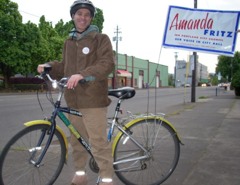
(Photo: Robert Wilson)
During a debate with Charles Lewis back in September, Fritz said she would have voted “no” on the controversial Columbia River Crossing project. That stance would have made her the only commissioner to vote against the project. According to a report on the debate from the Portland Mercury, Charles Lewis asked her to explain her CRC vote:
“I would have voted no, because I think there needs to be more discussion,” about the bridge plan and how it fits into the surrounding neighborhoods and how we’re going to pay for it. “We need to make sure that the six pages of conditions [imposed by the city council] are met… there’s a lot more work to do.”
(Lewis, on the other hand, said he would have voted in favor of the CRC. The Mercury reported that he said, “it’s a bottleneck that “has stifled our economy” and that he doesn’t want to “turn down” $4.2 billion of “investment in our community.”)
As for bicycling, Fritz may not be joining mayor-elect SamAdams, Commissioner Randy Leonard, or Commissioner Nick Fish for a bike ride any time soon, but it’s definitely on her radar.
Fritz didn’t get the endorsement of Bike. Walk. Vote. (she was up against some very bike-friendly candidates in the primary), but she says she’s experienced what a bike-friendly city feels like and she “knows it can be done” in Portland.
Writing on her blog back in December 2007, Fritz recalled her experience living in Cambridge, England.
“Car drivers and bicycle riders watched out for and respected each other. We shared the roads. Car and truck drivers recognized that without bicycle commuters, there would be much more congestion. Bicycle riders obeyed traffic signs and wore reflective clothing…I’ve seen good bicycle and pedestrian facilities, experienced living in a city valuing and providing them. I know it can be done.”
She wrote that, “we are far from that scenario in Portland today” and that on the campaign trail many of her neighbors in Southwest Portland said safe bikeways and sidewalks are their most pressing concern. “A Big Picture goal of addressing global warming,” she wrote, “lacks meaning if kids can’t walk to school, and folks can’t bike to the local store.”
Fritz might not know what it’s like to bike on the streets of Portland on a daily basis. She doesn’t worry about getting a photo-op with her bike and doesn’t pretend to be “one of us”. But maybe Fritz is a new kind of bike-friendly leader in Portland; one that transcends the “bike issue” and understands that we’re in a post “bike-community” era.
Portlanders who care about biking are an increasingly large and diverse part of our population. I think it’s much more important that we have a commissioner who will listen and consider what we as Portlanders, not as “cyclists”, want.
Welcome to City Council Ms. Fritz. I look forward to working with you in the months and years to come.
– – – –
As for Charles Lewis, it’s tough (especially as a publicly financed candidate) to get the level of name recognition needed to win your first election. I hope we see him run again and I wouldn’t be surprised if he snagged a seat next time.
– Learn more about Amanda Fritz on her Issues page.



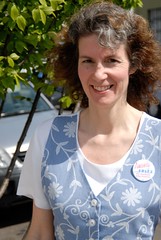
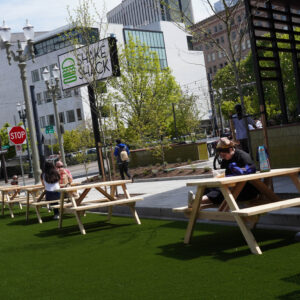
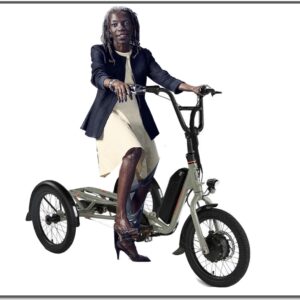

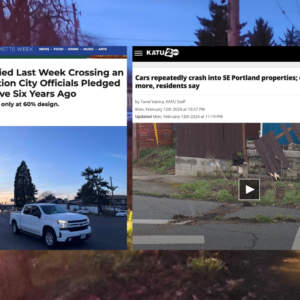
Thanks for reading.
BikePortland has served this community with independent community journalism since 2005. We rely on subscriptions from readers like you to survive. Your financial support is vital in keeping this valuable resource alive and well.
Please subscribe today to strengthen and expand our work.
Hi Jonathan,
Don’t underestimate Amanda’s potential support of cycling. Close Fritz friend and prominent campaign member Linda Robinson is one of the co-creators of the Gateway Green Vision Plan. (She even has a Fritz button in your photo.)
http://bikeportland.org/2008/05/20/an-exciting-vision-for-bikes-at-gateway-green/
Campaign staffer Jasun Wurster is also an avid cyclist and cycling community advocate.
Perhaps the cycling community here can “Inform and Inspire” Amanda, and get her involved with making SW Portland more cycling friendly.
hi Yvette,
i certainly don’t underestimate Amanda’s potential. I know Jasun Wurster well and it was great to hear he was working for her campaign (during the primary, not the general).
and I agree with you that this site, and the community in general, can do a lot to educate Amanda and help her make the best decisions about transportation, the environment, health, community, etc.. (all issues that bikes are integrated with).
perhaps I should invite her and Commissioner Nick Fish to an upcoming Social event?
Banning cell phone use is probably the most important single issue that would dramatically improve road safety and I applaud her for taking a principled stand. Unfortunately that sounds like an issue for the state legislature, not the city commissioners.
That was quite generous given the record, Mr. Maus.
We’ll see the next time a Sauvie Bridge-like opportunity arises. I withhold judgment until she actually does something.
Remember Tom Potter, the recumbent-riding Critical Mass’er? He talked a pretty good game too in the early days prior to being put on the spot to make tough decisions. And when he reached that point, what exactly was his contribution again? Oh right, he killed both the transportation funding package (120 miles or so of bike boulevards) and the Sauvie Bridge move for political purposes.
Your glass can be half full. Mine is half empty. Respect is earned. She was wrong on Sauvie.
“That was quite generous given the record, Mr. Maus.”
I guess after last night I’m in a generous mood.
as for Sauvie… i think mistakes were made by Adams that could have helped thwart arguments like Fritz’s..
I think if Adams would have gone about the entire project a bit differently, Fritz (and a lot of other Portlanders who hated the idea) might have come around.
I think Adams lost that because of the “emergency funding” thing and because they didn’t put the project out in the open until too late. That created a perception by many that it was a rush job, a special pet project.
(of course, having it happen during a political race where your opponent is stabbing you repeatedly about it doesn’t help).
I don’t think Fritz is like Potter at all. I do agree with your assessment of his bike track record however.
Potter is sort of like McCain. He had some great things about him at first, but once the politics got messy, he turned messy.
Ouch, my ears are burning…
From my time volunteering with Amanda’s campaign I learned that she is a great listener and is very concerned with livability issues facing the city as a whole. Like all members on city council, she needs to directly hear your concerns.
Here is the deal.
* Portland tax revenues are going to fall next year thanks to the economy (less money for bicycle projects)
* People are loosing their jobs and the jobs that remain pay lower than in other places (less money for bicycle projects)
* The PDC, PPB and PPS has some serious issues (these are places where bicycles could be used much more)
* Finding an affordable place to live is getting harder as people who are loosing their homes become renters (commuting via bike from Beaverton, Gresham and\or Vancouver is not very realistic and out of the realm of Portland City Council)
We all agree that bicycles are a vital component to solving the above and many other problems. However, for urban cycling to be incorporated into the legislated solutions you need to organize and repeatedly communicate with your elected leaders your concerns.
I do caution that you do NOT solely rely on lobbying groups such as the BTA. The reason is that you need to personally interject cycling as a solution by doing the following:
1) if you voted for Amanda send her a congratulations email ( AmandaFritzrn@aol.com ) letting her know you voted for her and offer to help her with issues that are important to you
HINT: Politicians have a limited staff and can use all the free help researching policy that they can get
2) become part of citizen committees that shape policy
3) give testimony at public hearings and city hall meetings
4) ask city commissioners to join with other cities and officially lobby Salem for legislation and\or funding that is complementary to bicycling
Most importantly remember that it is up to you to frame your solution to non-cyclists as a component in terms that they can understand and politically buy into. Once you find a way to do this the onus is on you to organize with others and coordinate talk to ALL of your Commissioners, State Representatives, State Senators, Metro, Tri-Met and State Departments ALL the time.
Being a good citizen takes time, effort and organization. It takes even more to propagate the urban cycling meme to get it translated into a political reality.
jasun
Jansun Wruster,
Congratulations on Amanda�s victory last night.
Just a couple of quick counterpoints-
� An economic downturn makes bike projects more important, not less. Biking is a less expensive method of traveling than by car. In addition, money spent on bikes tends to stay more in the community than money spent on cars and gasoline. If we enhance the bicycle infrastructure, we can save the city�s citizens money that would have otherwise been spent on gas and car maintenance.
� Housing is more expensive, but there are still many poor people in the city limits. There are also many renters in parts of inner SE. Having a healthy bike infrastructure and public transit helps offset high housing costs by saving on transportation. I could never have afforded my house in inner SE if I owned a car and had to make payments and buy gas.
� You mean �losing� not �loosing.�
Best of luck in city hall,
Biking Viking
Mr. Wruster, we appreciate the extensive lecture on the intricacies of successful bicycle advocacy and city politics generally. One presumes it comes from a good place.
That said, your understanding of successful bicycle advocacy, city politics, and the state of the city generally is limited at best. #7 makes the most important points, worth elaborating on.
The cause and effect relationship between the city’s economic status and bicycle funding you are quick to assume does not exist. With all due respect, if you knew what you think you know, you’d know that PDOT has allocated on average 0.7% of its budget for bike projects.
This is called decimal dust. Decimal dust gets sprinkled in a haphazard manner largely at the discretion of the commissioner in charge. No disrespect to Roger Geller, but he’s the first to admit he’s not the man with the money. Rather, he is an opportunist by necessity.
Most important, an economic downturn is the *perfect* moment to increase investment in bicycling. You presume it should be treated like any other non-essential expense. I strenuously disagree. People need safe, effective travel options regardless of the state of the economy, and none is more effective in the urban environment than bicycling. Check the price tag. In the words of Roger Geller, it’s the “cheap date.”
Back to Mr. Maus, you know all of this, of course, which is why I’m disappointed as a regular reader that you gave our new city commissioner such a pass. That’s not like you. You say all the time that Portland’s elected leaders need to stop celebrating their freshman year championship and start acting like varsity starters if their actions are going to match their rhetoric.
Mr. Wurster is clearly a product of the Fritz school of bicycling: nice to have and we’ll get to it when it’s convenient to do so. But when one of those elected officials steps up like a varsity starter with a game-changer project, there goes Fritz talking about the lack of sidewalks in her SW Portland neighborhood (or whatever) as more important. How convenient in an election cycle.
But she’s wrong. The city has to make investments strategically, not based on the feel-good but arbitrary notion of “equity.” You have to maximize return on investment. That’s how it actually works. Politicians don’t tell you that because it sounds icky or “unfair” to the general public. There aren’t enough dollars for every neighborhood to achieve platinum status concurrently.
Besides, not every neighborhood wants platinum status. For instance, SW. The only thing people in SW hate more than the lack of sidewalks is paying for those sidewalks like everybody else in Portland already has. SW’s bike and ped infrastructure in 10 years is going to look substantially similar to today’s (with apologies to good soldier Keith Liden).
All of which is a long-winded way of politely reminding Mr. Maus that the Fritz record isn’t consistent with his own advocacy and therefore may not be deserving of the free pass he just gave her. I’m a regular reader because he does his homework and consistently gets it right. I can certainly understand why he might have been punch drunk after last night’s historic victory. But I gotta say what’s up?
Hey Guys,
I totally get what you are saying.
My example about lower tax revenues being a rational for limiting bicycling projects is NOT something that I believe. Come on, if the slue of PSU transportation classes and first hand experience has taught me anything… I know how inexpensive bike and ped projects are and how much money urban cycling has personally saved me.
I am not getting a job in this decade at City Hall nor do I represent anyone else but Jasun Wurster. Which is cool because I can say stuff like this.
If you really want to increase bicycling in this city we need to learn how to bundle bicycling as “part of the solution” than strictly as “the solution”. We need to escape the constraints of our groupthink and work with in the political reality that the majority of the minds in the electorate are the ones that we need to change. Currently they do not care and see any money spent (especially in a recession) as a waste. I know, this really sucks…. I guess I will be the one to tell you that Santa and the Easter Bunny are not real.
One last thing: ‘Bike to Work’, would you kindly retract your highly misleading statement: “Mr. Wurster is clearly a product of the Fritz school of bicycling”. Then give me a call at 503-799-7919 so that we can set up a time to have an exchange of ideas in person and we can get to know one another?
I am Jasun Wurster and I approve this message 😉
jasun
Bike to Work,
first, I think you and I see things the same way on a bike/funding policy level… but you just don’t like my tone in this story.
now, let me respond to your comment…
“I’m disappointed as a regular reader that you gave our new city commissioner such a pass.”
I don’t agree that this story equals a “pass”. This story was meant as a positive-toned introduction to Fritz. I will have many more opportunities to cover her once she’s in office and I will definitely not be giving her a “pass” on anything.
“You say all the time that Portland’s elected leaders need to stop celebrating their freshman year championship and start acting like varsity starters if their actions are going to match their rhetoric.”
She hasn’t even taken office yet. she has not even taken one “action”. let’s see how she does on issues related to biking… then come back and read about it here.
“But she’s wrong. The city has to make investments strategically, not based on the feel-good but arbitrary notion of “equity.”
We agree! I wrote in the story that I didn’t agree with Fritz’s opinion on the Sauvie Bridge precisely for this reason. That was an opportunity to make a strategic investment that would have paid major dividends for our city. I think Fritz got that wrong… but I also think there were some mistakes made with how the project was handled.
“There aren’t enough dollars for every neighborhood to achieve platinum status concurrently.”
again. I agree with you. This is how I think Geller feels as well… but if a decision comes up about this it might be an interesting fight at City Hall. I think we should have leaders who can say, “I realize East Portland isn’t like inner SE, but we have to look at where we get the best return on investment.”
“SW’s bike and ped infrastructure in 10 years is going to look substantially similar to today’s “
I can assure you that will be true if we all don’t make our voices heard when necessary and hold our elected officials’ feet to the fire.
“the Fritz record isn’t consistent with his own advocacy and therefore may not be deserving of the free pass he just gave her….I gotta say what’s up?”
what’s up is that I’m a guy who started a blog a few years ago that now a lot of people read and have very high expectations of. That’s great. I love it and I try to reach those expectations.
I am not a professional advocate. I am a citizen journalist who happens to care deeply about bike issues.
I am still learning about how all the pieces fit together and still learning about the records of all the players. As a regular reader you should understand that I cover a wide range of topics…not just policy and politics. I try to know be an expert in a lot of areas and that’s a hefty task.
I really appreciate your feedback and I have heard it loud and clear.
Stay tuned for more political/policy coverage.
just a short comment: in the end i voted for Amanda because of her skeptical position on the Columbia River Crossing. You can fuss all you want over the Flanders bridge, but you’d be missing the point.
I think banning cell phones would be a great idea, also no carrying packages in your arms when riding. What can be more dangerous than that? I have seen bikes wreck while trying to carry groceries. No headphones while riding.
Anybody caught dissobeying safety rules should be sent to a class at Emanual Hospital taught by trauma nurses. 2nd offense $100.00 fine.
Yes- there can be much to gain from having a nurse in city hall.